In Leif’s words …
Who/what inspires me: Compassion for all living beings.
Motto: Compassion, protection, freedom.
Leif Cocks scanned the gloom of the rainforest, a tangle of trees casting a green glow through the undergrowth, when he discerned a flash of orange in the tree tops far above. He called out, hoping the form may be the orangutan he yearned to see. The creature swung through the canopy towards him. A smile spread across Leif’s face. He’d recognise this orangutan anywhere. For here before him was Temara, the zoo-bred orangutan he’d organised to be released into the wild two years before.
Here they were meeting as equals for the first time. While they’d enjoyed an excellent relationship while Temara was in captivity, she was now here on her own terms – a wild animal free to go where she wished. And this creature was choosing to see her former keeper. She not only approached Leif but swung down through the trees to greet him, extending out her arm, grasping Leif’s hand and looking him in the eye.
For Leif, it was an emotion-charged moment – a reward for the years of anguish he’d experienced in his long fight to save a fast-shrinking orangutan population from extinction. For this was a good news story amid a horrendous chapter in this great ape’s fight for survival, a win among incidents so horrific they sound like atrocities from a genocide.
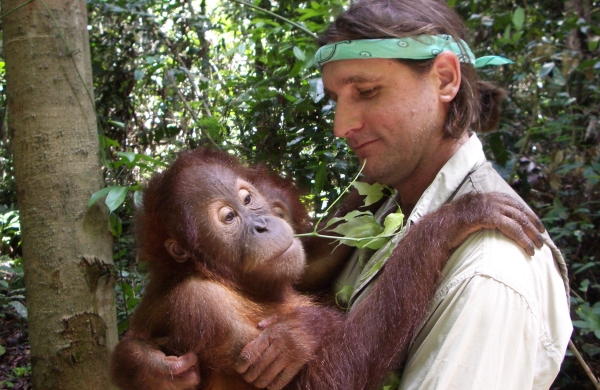
Battle for survival
While most of us realise that orangutans are at risk from deforestation for logging and palm oil plantations, fewer people understand just how horrific their fate. For those animals not killed along with the destruction of their habitat slowly starve, forcing them to seek out food from nearby farms. Angered at the damage to their livelihoods, the farmers retaliate. They take machetes and slash down mother orangutans, tearing their babies from their dying grasp to sell as pets. They douse them in petrol and set them alight. They crush their skulls with blunt weapons. They shoot out their eyes with low-powered guns.
Despite such atrocities, Leif knows of not a single incident in which an orangutan, a powerful beast, has killed a human. Leif says these animals possess a sense of empathy, of altruism, not usually associated with animals. He says their destruction is as horrific as the loss of a human child.
Their future continues to look bleak. Some of the richest and most biodiverse forests in Indonesia are earmarked for commercial exploitation under a plan drafted by the new government of Aceh. This area is home to some of the 14,000 remaining Sumatran orangutans. Should the plans go ahead, Leif believes the Sumatran orangutan will slip into extinction within a few years. While the Bornean orangutan population is bigger, at about 60,000, they too face extinction without intervention.
Leif is in a desperate battle to save them. But what compelled Leif to dedicate his life to saving these magnificent creatures?
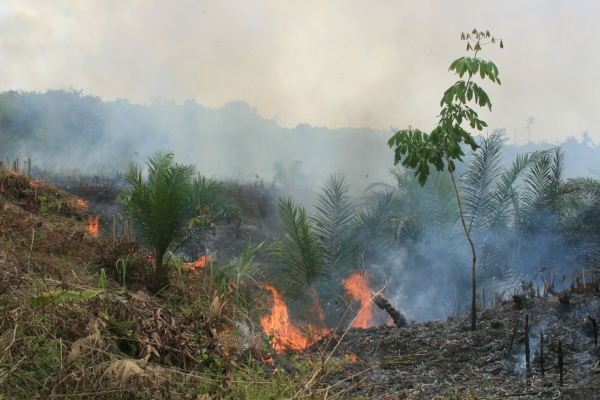
Meeting orangutans
Rewind 30 years and Leif was a young zoo keeper at Perth Zoo in Western Australia, when he was offered the job of orangutan keeper. Things were different back then, safety standards laxer. So Leif had no idea that some people regarded these human-like apes as dangerous. He thought nothing of entering their enclosure to have lunch with them. And it didn’t take long for a mutual admiration to emerge. For Leif quickly came to realise orangutans weren’t like other animals. Here was a highly intelligent, emotionally and culturally complex creature, with DNA that is 97 percent identical to humans’.
Not only did he come to love the orangutans, it appeared they felt the same way about Leif. “We really got along,” Leif says. “What I discovered is that orangutans are persons – they are as intelligent as a five or six year old [human]. They are self-aware. I realised they didn’t belong in captivity. They needed to be free in the wild.” And so began Leif’s quest to save them.
“They needed to be free in the wild.”
Growing fascination
Leif’s fascination with orangutans grew the more time he spent with them. He recounts the story of one female orangutan at the zoo who seemed intent on escaping. She’d remove every third brick from the wall to create a ladder which would enable her to climb the wall to freedom. However, she had enough guile to know Leif’s job was to foil her bids for freedom. So, this wily orangutan would keep a look out for Leif and rush to replace the bricks she had prised lose whenever she saw Leif approaching.
Another orangutan did manage to escape from its enclosure into the halls of Perth Zoo. The first thing this orangutan did with a taste of freedom? Rush through the halls and attempt to unlock the cages of his fellow orangutans so they too could be free. These were no ordinary animals.
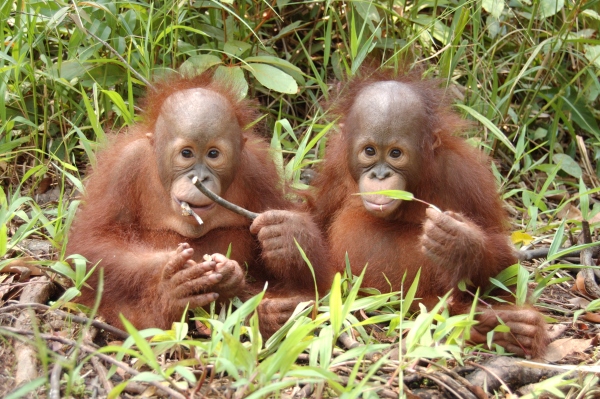
Wild orangutans
Around the same time Leif started visiting the jungles of Kalimantan in Indonesian Borneo to see orangutans in the wild. Here he came to realise that different orangutan populations have their own unique societies and cultures. Unlike other animals that are born with instinct and quickly leave their mothers to fend for themselves, orangutans must learn the tools of survival from their parents. A mother orangutan will nurse her offspring for six years, a time in which she also instructs them on which plants to eat, what tools to use – a cultural toolset for living.
The problem with this lengthy maturation is that orangutans are the slowest reproducing species in the world. Combine this trait with the fact that 80 percent of their habitat has been decimated in the past 20 years and you have a creature destined for extinction.
Rescue quest
Smitten with the wild orangutans, Leif began making more trips to Indonesia to study them. He realised that big corporations were destroying the rainforest for short-term profits. He came to learn of the horrific fate that awaited many of the refugee orangutans. So he launched The Orangutan Project (TOP) to fund efforts to save the baby orangutans left orphaned. It’s no small task – more than 2,000 orphaned orangutans live in care centres in Borneo and Sumatra today.
Aside from rescuing orphans, Leif started working with the Indonesian Ministry of Forestry, the police and the army to rescue and rehabilitate captured orangutans.
He remembers one incident in which he got wind of a young orangutan kept in a cage at a bitumen factory, destined for sale on the black market. Leif attended the site with local police in an attempt to rescue the hapless creature. Leif’s job was to guard the orangutan to prevent its capturers killing it before release – a spiteful yet common move often involving poison. At this particular rescue the offenders refused to hand over the key to the orangutan’s cage. So, while the police grilled the offenders, Leif snapped the lock and freed the creature. He took him back to the TOP-funded care centre where he was released into a safer area for rehabilitation.
Like all male orangutans, this one wandered, eventually roaming out of the safety zone into an illegal logging company camp. Here the loggers took to the orangutan with machetes, slashing great wounds into his flesh. He managed to escape, crawling back to safety. While his physical wounds recovered, it took much longer to heal his mind. Like human refugees exposed to trauma, orangutans need rehabilitation to recover both mentally and physically. Again TOP helps. But how to provide psychological help to an orangutan?
The answer is simple – shower it with love. “They need touch, love and affection for their mental wellbeing,” Leif says. Human carers provide this love to the infant orangutans – with plenty of cuddles and affection. Older orangutans are paired with compatible groups where friendships develop and love heals mental wounds.
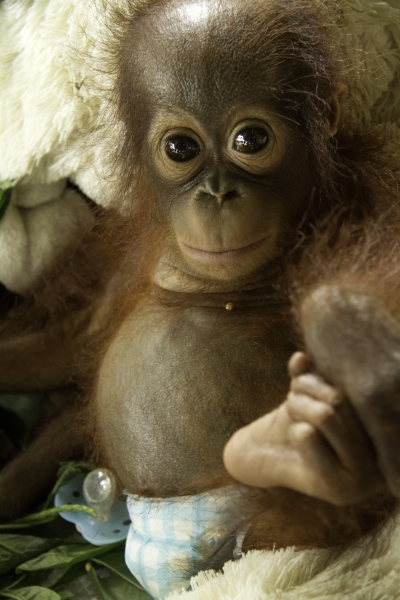
“They need touch, love and affection for their mental wellbeing.”
Hope
Leif quickly came to realise TOP’s main aim should not be simply to rescue orphaned orangutans but to prevent their becoming orphans in the first place. And the only way to do this is to protect their habitat. With this in mind, TOP is now leasing vast swathes of rainforest in Sumatra to protect orangutan homes. It already protects some 2,900 orangutans in 150,000 hectares of forest.
But just leasing the land is not enough – orangutans also face the menace of poachers seeking orangutan infants for the pet trade and of illegal loggers slashing down the leased land. To protect the areas it leases, TOP also funds wildlife protection units to patrol the rainforest.
Last year alone the organisation rescued 65 orangutans, cared for 157 orangutans in rehabilitation centres and released 26 orangutans back into the wild. It helped launch 10 legal cases against deforestation and funded 20 community development projects to help save the land through organic farming practices, and more sustainable agriculture. And it reached 100 schools and community groups in a bid to educate locals about these magnificent creatures and the need to save them.
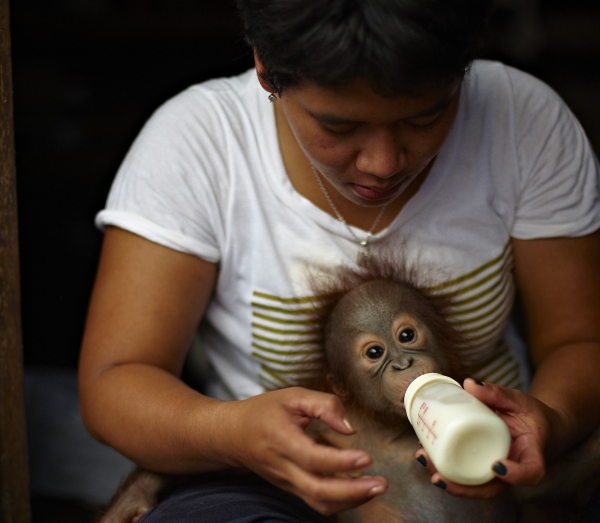
Striving for a better world
As TOP grew, Leif was able to retire from his position at Perth Zoo and work with TOP full time. He soon found himself not only rescuing orangutans but other creatures as well.
“With deforestation you might have 120 elephants who’ve got nowhere to go and so they start raiding crops so the people start shooting and poisoning elephants and the elephants start killing people,” Leif says. “And while we’re here to save the orangutan you can’t do this while elephants are killing people so all of a sudden we’re now in the rescuing elephant business as well.”
The case was the same with tigers, silver gibbons, bears and the Asian rhino. It wasn’t long before Leif was supporting aid agencies for each of these creatures, all operating under the umbrella organisation Wildlife Asia.
“We’re about trying to make a better world for all living things,” Leif says. And those ‘living things’ include people. Leif says it’s the subsistence farmers who often suffer the most from big corporations which swoop in, clear the forest and replace it with palm oil plantations. The destruction of native habitat causes floods, drought, erosion and damages food production for millions.
Leif is dumbfounded at how people can cause such destruction to people and animals. “The suffering is beyond our comprehension,” Leif says. “This is my gripe with humanity – that seemingly normal and decent people are causing unimaginable suffering in the world. Our capacity to be wilfully blind to our effects on other living things is unbelievable. It’s not a case of wildlife versus people or environment versus economy, it’s about letting a few greedy people get richer at the expense of all other living beings.”
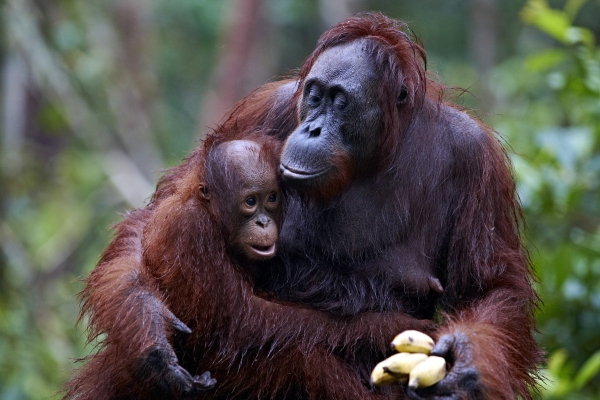
“We’re about trying to make a better world for all living things.”
Love
Leif dreams of gaining sufficient funding to purchase 1,800 square kilometres of land as safe orangutan habitat. This would be sufficient to protect 8000 orangutans with enough genetic diversity to prevent them from extinction. It would also require the employment of 180 wildlife protection rangers.
But to do this he needs money, and a continuing flow of it – some $20 million a year. For this he relies on people making regular donations to fund TOP’s work, people ‘adopting’ orphaned orangutans, and guests on eco-tours who raise money to fund TOP and travel to see its efforts first hand.
Leif says people get swept up in the high of helping to save a species. “Happiness is only achieved with selflessness,” he says. “When people see how their money is affecting the change they want to see in the world they feel happy, they are making a difference. This is what it’s all about. Without wanting to sound like an old hippy, it really is all about love.”
“It really is all about love.”
Get involved …
You can support The Orangutan Project’s work in several ways, including adopting an orangutan orphan, providing regular donations or participating in an eco-tour to see these magnificent creatures firsthand. Find out more by visiting the website www.orangutan.org.au.

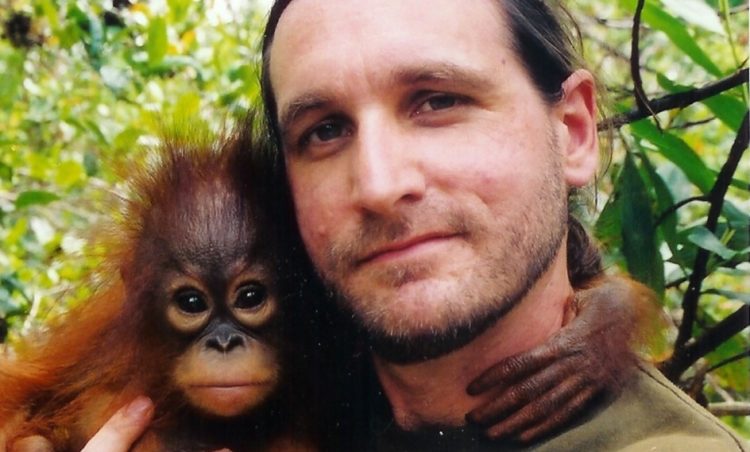


You are such a wonderful inspiration, Leif! Thank you for sharing your work – giving others tools and ideas to help us pursue our dreams to help animals.
Thanks for the comment Lynne. If only the world had more people like Leif.